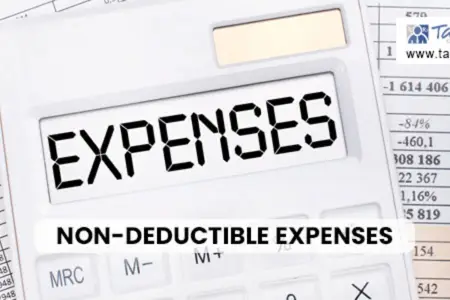Non-deductible expenses: What you need to know
Comprehending non-deductible expenses is vital for managing your finances. Join Aniday as we explore the world of non-deductible expenses, uncovering their significance and the need to stay informed.
What Are Non-Deductible Expenses?

To simplify, non-deductible expenses are costs that the IRS doesn't permit for reducing your taxable income. They don't have the tax-saving benefit, so recognizing these expenses is pivotal for effective financial management.
The Significance of Understanding Non-Deductible Expenses
Understanding non-deductible expenses isn't just for experts. It's a core of financial literacy, enabling wise choices, reducing taxes, and fostering fiscal responsibility.
For instance, an excess of non-deductible expenses might disqualify you from itemizing deductions, causing you to lose out on valuable tax benefits like mortgage interest and charitable contributions.
Common Types of Non-Deductible Expenses

In the intricate tax landscape, grasping common non-deductible expenses is crucial to discern what can and can't be deducted.
-
Personal Expenses: Daily essentials like groceries, clothing, and entertainment aren't tax-deductible.
-
Non-Deductible Business Expenses: In business, certain expenses like fines, penalties, and extravagant entertainment are non-deductible. Understanding these restrictions is crucial for accurate financial planning.
-
Non-Deductible Investment Expenses: Expenses related to investments, such as brokerage fees and personal investment advisor fees, are generally non-deductible. These fees can erode investment returns if not properly managed.
Difference between non-deductible and deductible expenses
Distinguishing non-deductible from deductible expenses is vital for effective financial planning and lower tax liability.
1. Common Ground Between the Two Expense Types
While non-deductible and deductible expenses differ significantly, they both share the purpose of managing your finances efficiently. Both types are critical components of your financial landscape and require careful attention.
2. Key Distinctions to Be Aware Of
The key contrast is in how they affect your taxable income. Deductible expenses lower it, while non-deductible ones don't. Recognizing this difference empowers smarter financial choices.
How to manage non-deductible expenses?
There are several effective strategies for handling non-deductible expenses:
-
Financial Planning: A well-structured financial plan is vital to manage non-deductible expenses. It should encompass all expenses, both deductible and non-deductible, ensuring financial stability.
-
Smart Expense Management: Reducing non-deductible expenses is key. Thoughtful budgeting and cost-effective choices lessen their impact on your financial well-being.
-
Embracing a Savings Mindset: In light of non-deductible expenses, adopting a savings-oriented mindset is crucial. Setting aside part of your income for savings can ease the financial impact of non-deductible expenses.
Consequences of Neglecting Non-Deductible Expenses

Neglecting non-deductible expenses can harm both individuals and businesses financially.
-
Increased Tax Burden: Ignoring non-deductible expenses can lead to a higher tax bill, potentially causing you to overpay in taxes.
-
Financial Instability: Neglecting non-deductible expenses can lead to financial instability. Unchecked costs can strain your budget and potentially lead to debt or financial hardship.
-
Impacting Personal and Business Financial Plans: Failure to manage non-deductible expenses can disrupt your financial goals, both on a personal and business level. It's crucial to address these expenses to stay on track with your financial plans.
Country-Specific Adjustments
Understanding the nuances of each country's tax regulations can help you avoid mistakes and optimize your financial standing. Here are some examples of differences in non-deductible expenses regulations across Singapore, the United States, and Vietnam:
-
Personal expenses in Singapore include costs related to health and education. Meanwhile, in the United States and Vietnam, these expenses are often considered eligible and deductible.
-
Entertainment expenses in Singapore encompass expenses for sports and leisure activities. In the United States and Vietnam, these expenses are typically only considered valid if incurred for activities directly related to work or business.
-
Charitable contributions in Singapore are not limited to a specific contribution amount. In contrast, charitable contributions in the United States and Vietnam are usually capped at a certain percentage of taxable income.
* Advice for Singaporeans
Here are some helpful tips for Singaporeans on how to manage non-deductible expenses:
Master the Singaporean non-deductible expense rules by visiting the website of the Inland Revenue Authority of Singapore.
Maintain expense records for validation, track expenses efficiently with software, and explore credit cards offering rewards or cashback.
When in doubt, consult a tax advisor for regulation insight and financial optimization.
Conclusion
In conclusion, grasping the concept of non-deductible expenses is fundamental to maintaining financial stability and making sound financial decisions.
Aniday hopes that this blog post can provide you a comprehensive understanding of non-deductible expenses. With the right knowledge and proactive financial planning, you can maintain a healthy financial landscape.
Aniday's HR Services
Headhunting Service
Find and recruit quality candidates in just 1 week! Supported by 40,000 experienced headhunters in IT, Finance, Marketing… capable of recruiting in any region.
Headhunting Service ➔Employer of Record (EOR) Service
On behalf of your business, we recruit employees and handle payroll without the need to establish a company in markets such as Vietnam, Singapore, Malaysia, India, Indonesia…
Employer of Record (EOR) Service ➔